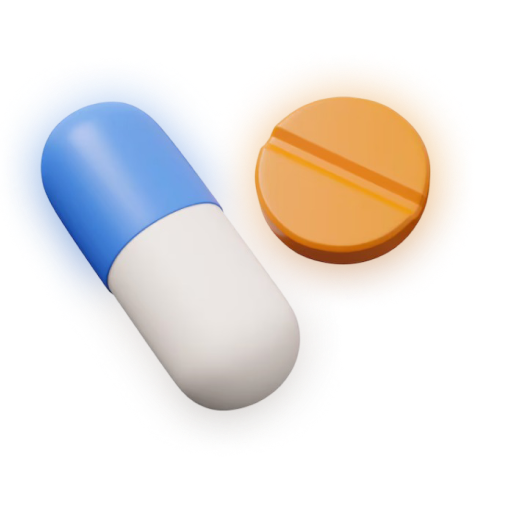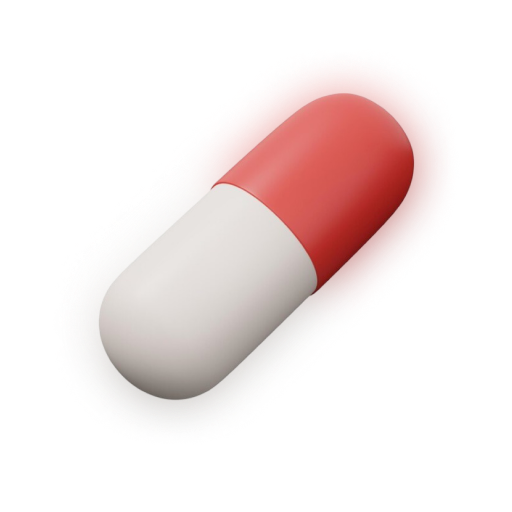Amiodarone – 200 mg, 100 stk.
Potent antiarrhythmic for serious arrhythmias


Description
Generic Name: Amiodarone
Brand Name: Cordarone, AmioHEXAL, Aratac
Drug Class: Class III antiarrhythmic agent
This is a prescription medicine, which requires a valid prescription!
Indications
- Life-threatening ventricular arrhythmias (e.g., ventricular tachycardia, ventricular fibrillation)
- Atrial fibrillation (especially when rhythm control is prioritized and other options are unsuitable)
- Supraventricular tachycardia (SVT) in selected cases
- Arrhythmia prophylaxis in certain high-risk cardiac conditions (off-label in some settings)

- Primarily blocks potassium channels → prolongs repolarization and action potential duration
- Also has Class I (sodium channel), Class II (beta-blocker), and Class IV (calcium channel) effects
- Slows heart rate and conduction through AV node
- Increases refractory period
- Suppresses ectopic pacemakers and reentry circuits
- Initial: 200–400 mg 2–3× daily for 1–2 weeks
- Maintenance: 100–200 mg once daily (minimum effective dose)
- Take consistently with regard to meals
- Long half-life: up to 50 days
- Requires close monitoring (ECG, labs, imaging)
- Common:
- Bradycardia
- Hypotension (especially IV form)
- Photosensitivity
- Blue-gray skin discoloration (long-term use)
- Nausea, metallic taste
- Serious (can be life-threatening):
- Pulmonary toxicity (interstitial pneumonitis, fibrosis)
- Thyroid dysfunction (hypo- or hyperthyroidism)
- Hepatotoxicity
- Corneal deposits (visual halos, usually asymptomatic)
- Neurotoxicity (tremor, ataxia, peripheral neuropathy)
- QT prolongation → Torsades de Pointes (rare)
- Sinus bradycardia or AV block (2nd or 3rd degree) without pacemaker
- Severe sinus node dysfunction
- Hypersensitivity to iodine or amiodarone
- Pregnancy (especially in 1st trimester) and breastfeeding
Information
Warnings and Precautions
- Pulmonary toxicity: Baseline and periodic chest X-rays or pulmonary function tests
- Liver monitoring: LFTs baseline and during treatment
- Thyroid monitoring: TSH and T4 before and during therapy
- Eye exams if visual symptoms occur
- Avoid excessive sunlight exposure; use sun protection
- Monitor ECG and electrolytes regularly (especially potassium, magnesium)
- Interferes with many common lab tests (due to iodine content)
Drug Interactions
- Levels or effects of: Digoxin, Warfarin, Phenytoin, Cyclosporine, Statins (especially simvastatin)
- Risk of bradycardia or QT prolongation with: Beta-blockers, calcium channel blockers, fluoroquinolones, macrolides
- CYP3A4 and CYP2C9 substrate and inhibitor → extensive interaction potential
- Grapefruit juice: may increase serum levels (avoid)
Pregnancy and Lactation
- Pregnancy: Category D – risk to fetus; use only if life-threatening
- Lactation: Contraindicated – excreted in breast milk and may harm infant
Request Now
Direct Enquiries
For any inquiries, please feel free to contact us directly via email at the link below.
pharmacy@doctorworld.eu
PLEASE AVOID SELF-DIAGNOSIS AND SELF-MEDICATION!
Our website content is posted for informational purposes only. It is not intended to be used for primary diagnoses-making and should not replace a consultation with a professional health care provider. If you have any health issues or complaints, please consult your primary physician.
Health care data provided for informational purposes is not an alternative to an in-person physician consultation.